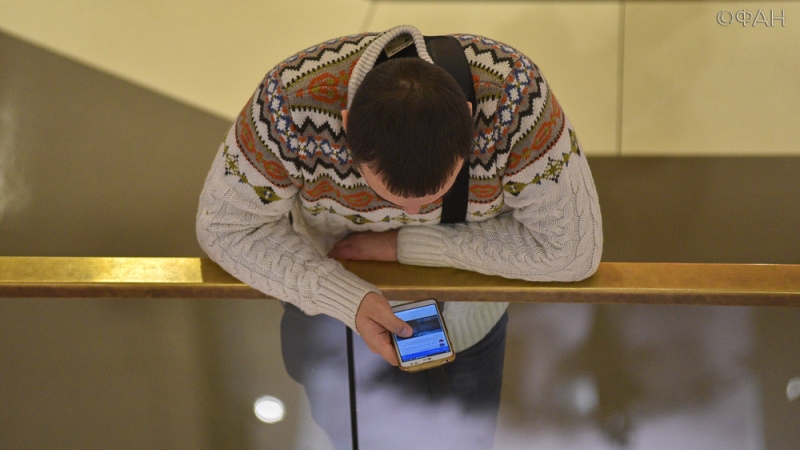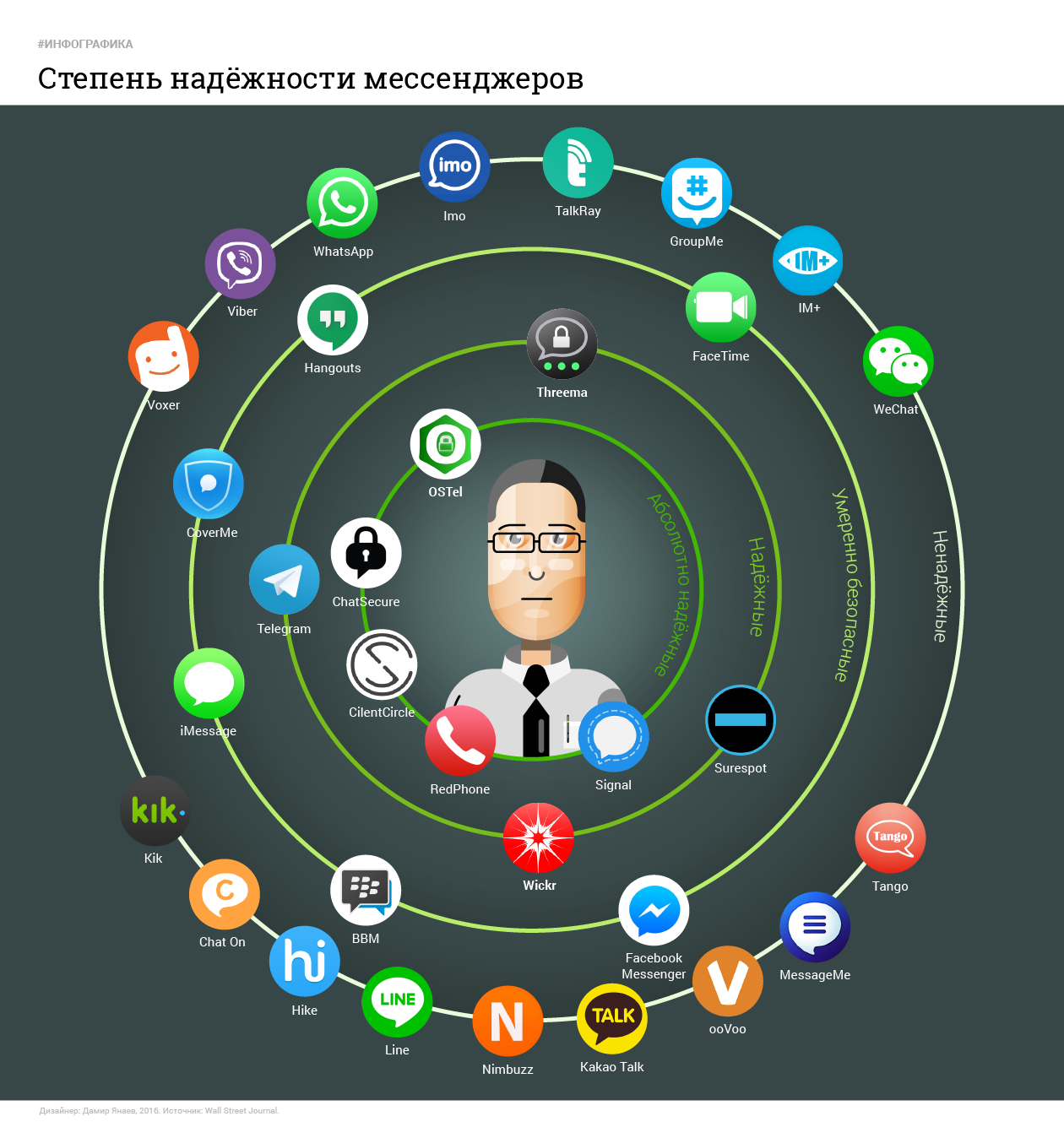Eight secure internet messengers. Messenger - breaking news.
At a closed meeting of deputies of the State Duma of the Russian Federation and the head of the FSB Alexandra Bortnikova the issue of creating a domestic messenger was discussed. Equally, both in parliament and in the FSB, this area of work is considered fundamentally important from the point of view of national security.
“I think that changes in legislation will be required to introduce our messengers in Russia and develop microcircuits. This is very important ", - REN TV quotes the words of the Deputy Chairman of the Duma Committee on Security and Anti-Corruption Dmitry Savelyev.
Russian messenger
Alexander Vlasov, an expert in the field information security, I fully agree with the Russian legislators.
“Creation of Russian software and messenger is an extremely urgent task. These are one of the few non-commodity products that we can not only successfully develop, but also export abroad. The example of Kaspersky Lab, Speech Technology Center and our other companies shows that Russia can create quite competitive products in this area, "- first of all, the expert noted in an interview with a reporter. Federal News Agency.

The task of creating an effective and secure Russian messenger, Vlasov believes, is best done not by government agencies, but by private capital. The Russian private sector has the potential to create a messenger that will work the same, and perhaps more efficiently, than the very same Viber, WhatsApp or Skype. “Yet the latter, as we know, was also developed by Russian programmers,” the expert emphasizes.
If such a messenger is safe and will solve both the problems of users and the problems of national security, then its distribution and implementation will not even have to be facilitated from the outside. Changes in Russian legislation will play only a minor role here.
Russian "iron"
It is known that along with computer systems and software, hardware was also discussed at a closed session of the Russian parliament. Bortnikov and the State Duma deputies noted the importance of creating and introducing in government agencies computer devices based on Russian developments. According to Vlasov, from the point of view of information security, this task is, perhaps, even more important than the development of a messenger.

Russia is now far behind in this regard. The overwhelming majority of accessories for computer equipment comes to the country from abroad. Therefore, potential ill-wishers of the Russian Federation - for example, Western special services - are able to penetrate Russian closed systems, using not only software but also the actual devices on which it is installed.
“In the 90s, when development was just beginning cellular networks, there were still Russian switches, routers and other telecommunications equipment on the market. Of course, it was assembled from Chinese, Taiwanese, Korean and Japanese components. Nevertheless, all this was subjected to thorough special checks and assembled into a finished product based on Russian algorithms. Unfortunately, in the 2000s, all this potential was lost, ”explains Alexander Vlasov.
Of course, it will not be possible to return what was lost in one jerk. Now Russian manufacturers will simply not be able to compete with such foreign companies as IBM, Huawei and Cisco.
“Nevertheless, we can take Western hardware and subject it to special checks in order to exclude all undeclared possibilities of interference in its activities. We can do this. Moreover, this must be done in order to close all the back doors, vents and air ducts that compromise our national security, ”sums up Alexander Vlasov.
The Internet Development Institute (IRI) has selected 13 domestic messengers, the best of them can be used by officials for official correspondence and business communication... It was Iran that initiated the introduction of the "state messenger". This initiative was later supported by the Ministry of Telecom and Mass Communications and Rostelecom in order to strengthen the digital sovereignty of Russia and prevent leaks of important state information. Life not only found out all the applicants for the status of "state messenger", but also figured out why officials should not use the usual WhatsApp and Telegram.
Experts from the Internet Development Institute (IRI) have completed testing messengers that claim to be state-owned. As Life found out, thirteen products were selected out of 34 applicants. Among them are the following messengers: "Sibrus" (developer of LLC "Cybernika"), Staply (LLC "Primavera" + LLC "CRT-innovations", PJSC "VimpelCom"; three versions), "Answer" (LLC "UKT"), Actor (LLC Actor), eMotion (PJSC Megafon), Kubik (LLC Platforma Kubik), Flodium (LLC Ommji Technology), Titanium (LLC Raketa), ICQ2016 (LLC Mail.Ru "), Dialog (Dialogue LLC), Bellchat (Federal State Unitary Enterprise" GlavNIVTs "of the Office of the President of the Russian Federation), B2G Messenger (PJSC" Rostelecom ") and RTIMS (LLC" RT-Inform "). Presumably, testing will last for three months and will end in January 2017.
Arseniy Shcheltsin, director of project activities at the Institute for Internet Development (IRI), said that "projects were submitted for the competition, which even exceed the basic requirements of the IRI in terms of information security."
For example, the development of SafePhone from the Scientific Research Institute "SOKB", ViPNet Connect (OJSC "InfoTeKS"), Secret Phone (LLC "Security Code"). The experts recommended that they be taken out for separate testing and application outside the current project. It is also worth noting products tailored for certain types of communications: Enkrypt (for lawyers), KliChat (for sellers), Knockchat (for neighbors), IQ300 (for tasks) and others. Their experience can be useful in other projects, he says. - IRI will continue to cooperate with all participants in the selection. The next step is to determine in which regions which products will be tested.
After pilot tests, the necessary management functionality, safety requirements, rules for the formation and storage of a database of contacts of officials, a single protocol for the interaction of various state messengers will be identified, the cost of launching and maintaining products will be named, '' he added.
I don’t remember that any domestic product, especially of this level and scale, was developed, on the one hand, with the involvement of a large number of developers, and on the other, with such a deep participation of the user audience - officials. We will make the product tailored to the needs of civil servants, - says adviser to the president Herman Klimenko.
By the way, not only the servants of the people themselves, but also ordinary users will be able to use such applications for officials. This was agreed at the Iranian working group. True, a special encrypted data transfer protocol will be developed for the communication of officials. For ordinary users, they will make a public version that runs on a different protocol.
Life figured out how promising domestic messengers were selected, which were specially created to convey the secrets of officials.
Test mode for the finalists of the "state messenger" project
In the next few months, the finalist messengers in test mode will be implemented in the structures Federal Service bailiffs, the Russian Post, the Federal Agency for Youth Affairs, in the constituent entities of Russia: Moscow, Ulyanovsk, Vladimir, Nizhny Novgorod regions, the Republic of Tatarstan, the Udmurt Republic, the Khanty-Mansiysk Autonomous Okrug. The curators of the project say that as a result, civil servants will not have one messenger, but a special data transfer protocol will carry out the "docking" of different applications.
According to the Internet Development Institute (IRI), a state messenger is an important part of ensuring national digital sovereignty and, at the same time, a window of opportunity for Russian programmers who, on a competitive basis, receive a guaranteed large-scale market within the country. It should become a means of operational communication for Russian officials when working with official information. It is planned that the future state messenger will provide its owner with a high degree of data protection, a "directory" of contacts of all Russian civil servants, and a hierarchical communication system.
Deputy Minister of Communications and Mass Media Alexei Sokolov is confident that the market's response in the form of applications received has confirmed the presence of strong communication software solutions in Russia.
I am sure that some services from among the leaders of the preliminary rating are no less competitive than well-known world communicators, - he says.
The tests were carried out in one stage and consisted in the assessment by experts of the working group and the Institute of such characteristics of applications as usability, data protection, readiness to "complete" specific functionality, in particular, the hierarchical organization of communication.
- Rostelecom is a member of the working group and at the same time presents its product - B2G messenger. We provide the state messenger project with expertise and technical support... We have a lot of competence in creating a certified secure channel for data exchange. Perhaps Rostelecom will act as an operator of the contact base for the state messenger, ”says Alexander Maslov, vice president of Rostelecom.
What did not pleaseWhatsApp, ViberandTelegram?
Russian officials, like ordinary users, love to communicate in popular applications - WhatsApp, Viber and Telegram.

Experts agree: the usual WhatsApp, which sends tens of billions of messages a day through itself, can hardly be called safe. Every now and then there are news about program vulnerabilities. In the course of one of the studies, it was found that the file with the history of correspondence located in the device's memory, being encrypted, can be hacked in a few moments using a simple script. And even more so, since recently the service belongs to the Facebook company, known for its connections with the American special services.
Other's free services for communication, from Viber to iMessage, things are no better.
There were also questions to Telegram, which Pavel Durov created. It was reported that hackers managed to gain access to accounts. Secret chats are an exception. Thus, when hacked, the attacker can not only carry out correspondence on behalf of the victim, but also read all the correspondence that the Telegram client uploads to the phone.
In principle, distrust in Telegram is caused by a combination of factors, - an interlocutor in the government explains to Life. - Telegram is not ready to cooperate with Russian law enforcement agencies, and the special services, accordingly, do not understand security issues. There are also questions about the ownership structure.
Many popular services still do not comply with the requirements of the law on personal data and store all information about Russian users abroad. In particular, this is the case with Facebook-owned WhatsApp messenger and Telegram founded by Pavel Durov. Only Viber agreed to transfer data to Russia.
The issue of creating a state messenger is overripe. Technologies have gone far ahead, they use this not only because these are Western technologies that have some kind of security. It is more convenient and faster than any postal services. They allow you to instantly exchange messages, call each other over the Internet, - says the head of the Duma Committee on Information Policy Leonid Levin. - If there is such a domestic service where government officials can exchange information and understand that this does not carry any risks, and this will be approved by our bodies, then it will be good.

Interestingly, in August 2015, the Secretary of the Russian Security Council Nikolai Patrushev already demanded that the governors take action against officials who use foreign Google services, Yahoo and WhatsApp. Because the use of resources located abroad by officials to resolve official issues is dangerous.
In March 2016, Moscow police were banned from texting about work. The ban affected the transfer of service information through instant messengers and social networks... Information appeared in the media that this could be due to the fact that one of the police units exchanged official information through foreign applications.
And in February 2016, Radio Liberty published material containing correspondence allegedly conducted by Moscow investigators in WhatsApp and Viber applications.
By the way, the officials themselves are eagerly awaiting the appearance of a domestic application. The Governor of the Kaluga Region, Anatoly Artamonov, said that he used to use WhatsApp with pleasure and was pleased with its functionality.
It is a very convenient means of communication, but, unfortunately, I am not using it now, because there was a recommendation. A Russian messenger, if it is similar in terms of content and efficiency, will be useful. Perhaps it will be made even better, - he says, noting that now he does not use foreign services even for personal correspondence.
I have one phone and one number, 20 years old. Therefore, neither for personal nor for business correspondence I don’t use foreign messengers. I wonder what the domestic one will be, ”Artamonov added.
11/07/2016, Mon, 12:09, Moscow time, Text: Igor Korolev
CNews has studied the draft Concept for the creation of a state messenger prepared by experts from the Institute of Internet Development. This application will be of two types: normal and for working with a guest secret, and in the latter case, it will not have to connect to the Internet. It is also interesting that the list of requirements for the messenger lacks support operating system MacOS.
The concept of the future state messenger
CNews has at its disposal a draft concept for creating a universal instant messaging system (messenger) for federal and regional executive authorities, developed by the Internet Development Institute (IRI). The document was written as part of the institute's project to create a domestic messenger that officials will use.
The document states that now in Russia from 50 million to 60 million people use instant messengers. The most popular of them is Viber (it is installed by 61% of users), in second place is WhatsApp (49%), in third place by a large margin of Skype.
Why officials can't use foreign Viber and WhatsApp
“Information disseminated through such a channel is not subject to any protection against unauthorized access, since it is stored on the operator's servers and access to it for government agencies is not recorded or disclosed,” the authors of the document warn. "This means that such information has every chance of being perlisted without any traces of" hacking "both by the service operator itself and by those to whom the operator can potentially provide such an opportunity, and is used at the discretion of the owner of such access."
Since the information exchanged by civil servants is of a non-public and often secret nature (including it may contain state secrets), the existing practice “poses a threat to the national security of the country,” the Concept warns. Earlier, the heads of a number of law enforcement agencies have already spoken out in favor of banning their employees from using foreign messengers.
MacOS is missing from the list of operating systems that the future state messenger should support
In addition, the set of software for communications that currently exists in government agencies no longer meets modern requirements: for example, a civil servant spends an average of 90 minutes to send one letter. All this means the need to create a separate Russian messenger for officials.
Officials will not be able to run messengers on MacOS
The authors of the concept distinguish two types of future state messenger: ordinary and for the transmission of information containing state secrets. An ordinary messenger will have to work in operating rooms Windows systems, Linux (AltLinux or Goslinux), iOS, Android, and Open Mobile Platform (Sailfish). At the same time, MacOS (and other names of the operating system for Apple computers) is absent in the list of platforms that the future state messenger must support.
In addition, the state messenger will have to work through web browsers (Chrome, Firefox, Safari), and also work as a SaaS solution (Software is the Service). The product will have to be able to work offline, providing access to the archive of messages.
The messenger must be registered in the Register of Domestic Software and be integrated with state information systems: ESIA (Unified System for Identification and Authentication), ESPD (Unified System for Program Documentation), SMEV (System for Interdepartmental Electronic Interaction) and FAP (Fund for Algorithms and Programs).
The product must be certified by FSTEC - according to technical protection confidential information, in the FSB - by means of cryptographic protection of information, as well as certification at the request of the absence of undeclared capabilities. The application must transmit data encrypted (using the https protocol), support end-2-end encryption and PIN lock. The time for deploying the messenger on the server of the organization should be no more than one working day, and the time for training employees to work with it should be no more than 1 hour.
The application must be able to integrate into the corporate intranet system to access mail, documents and calendar. User registration should be done at Email or through a corporate LDAP server, the password recovery function must also be supported. Among the users must be those who have administrator rights.
"Tree" of contacts for officials
The messenger should provide a transparent database of the organization's employees with limited visibility for non-executive personnel, incomplete visibility for line managers and full visibility for the head of the entire structure. In addition, a drop-down "tree" of contacts should be available, visible to all employees, and the ability to import a contact into groups from the internal system.
Contacts should be divided into many levels with different rights and capabilities. A level is assigned to one association of employees on the basis of belonging to one department, the same rank or position. By default, the user's visible contacts contain all members of the same level, the manager of the level, and contacts of the levels below. Then, everyone with whom he has ever communicated in the messenger is added to the user's contacts, and in order to communicate with other people from other levels, a request must be sent.
Messages can be sent between two users or within a group. There will be two types of communications in the messenger. Basic - exchange messages with employees of the same department and the same organization. The second type - project - involves the exchange of messages between the structures of one organization and between the structures of different organizations within specially created project teams.
The invitation to join the group is sent by its creator or any approved member, it can be sent to both a specific user and a level manager. In the second case, if the invitation is approved, then all employees at the level headed by this manager can be added to the group.
In a group, besides text messages, it will be possible to transfer emoticons, stickers, photos, documents, videos, graphic image, audio files, audio messages with decryption, etc. The group should have a repository of files sent to all members of the group or uploaded to it directly.
Support for hash tags and sending an urgent message should also be implemented (it will reach all members of the group, including those who have disabled the notification of receipt of new messages from this group). In addition to messages, it will be possible to create meetings for group members (in the format "subject-date-place").
In addition to users, "bots" will also be able to work with messengers. They will be able to inform employees, set tasks for employees, create events / meetings and sign documents using EDS (electronic digital signature).
Messenger with a guest secret, but without the Internet
As for the messenger for working with the state secret, authorization in it will be carried out using the login and password issued to employees in an envelope against signature, and - at the same time - by EDS. The main feature of this type of messengers is the lack of an Internet connection: messages should be transmitted only over internal networks. Minimum requirement by supported platforms - Windows and Linux.
The messenger for state secrets will have to support the mode of creating groups, have FSB and FSTEC certificates and carry out encrypted communications over encrypted channels. Messages and files transmitted in this type of messenger should be located inside the application and not visible file system, and each message must be signed with an EDS. There must be a function irreversible removal any correspondence - both private and group.
The equipment on which confidential messages will be stored and processed should be located in a special room. Access to such a room will be carried out with special passes with fixing the time of arrival / departure, it must also be subject to round-the-clock video surveillance. The equipment should not contain connectors for I / O interfaces, or access to it should be limited. The equipment itself must be “securely attached to the furniture to prevent removal”.
Director for Project Activities IRI Arseny Shcheltsin explained that this project The concept was prepared by the experts of the institute and was not called final, but was “the actual time vision of the project by a part of the experts”. The new version of the Concept will be ready by February 2017. This is done by a special working group, and the current version of the document will not be taken as a basis. But some meaningful points, for example, the requirement for the presence of a messenger in the Register of domestic software, will be included in new version document. Regarding a separate messenger for working with state secret, Shcheltsin noted that "from a legislative point of view, the prospects for the appearance of such a product are almost absent, but from a practical point of view, they are far from clear."
Earlier, Iran has already begun the selection of applicants wishing to become messengers for civil servants. Of the 34 applications received, 13 were selected: Sibrus, Staply (developed with the participation of VimpelCom), Answer, Actor, eMotion (created by Megafon), Kubik, Flodium, Titanium, ICQ (mail.ru Group ), Dailog, Bellchat (GlavNIVTS Office of the President), B2G Messenger (Rostelecom) and RTIMS (RT-Inform, a subsidiary of Rostec).
Now these messengers will be tested in a number of federal and regional authorities. It is planned that in the end not one, but several messengers will be approved for officials.
Experts have discovered a threat that spreads in Facebook Messenger, which forces users to install malicious software, writes Lenta.ru. Attackers hack Accounts users and send a link to friends. When lane
Banks.ru 5 days ago 0Minsk Housing and Communal Services Contact Center is developing messengers
The Minsk Housing and Utilities Contact Center has launched a new online service - a chat bot. The new product was announced at a press conference on 23 August by the director of the Center information technologies Minsk City Executive Committee "Oleg Sedelnik.
Naviny.by Belarus 7 days ago 0PayOnline launched a chatbot service for accepting card payments via instant messengers
The PayOnline processing center has launched a chatbot service for accepting card payments via Telegram messengers, Viber, Facebook and VKontakte, the press service of the company reported. “The botmother platform provides an opportunity for free and without the participation of prog
Banks.ru A day ago 0Putin signed a law regulating the work of instant messengers
Russian President Vladimir Putin signed a law regulating the activities of exchange services by email... The document was published on Sunday on the portal of legal information. Amendments to the Law "On Information, Information Technologies
Banks.ru 1 month + 1 day ago 0Putin signed the law on the regulation of instant messengers
Russian President Vladimir Putin signed a law regulating the activities of instant messengers, the corresponding document was published on Sunday on the Internet portal of legal information.
Interfax 1 month + 1 day ago 0The daily audience of WhatsApp worldwide has exceeded one billion people. Information about this appeared in the official blog of the messenger. Users send 55 billion messages to each other every day
Russia approved laws banning anonymizers and regulating instant messengers
Russian senators have approved laws banning anonymizers, VPN and Tor, as well as regulating instant messengers. The laws were passed almost unanimously: only one senator abstained from voting on the law on anonymizers; against the law on messaging
ASIA-Plus Tajikistan 1 month 6 days ago 0The Federation Council approved the law on the regulation of instant messengers
The Federation Council at its meeting today approved the law that regulates the activities of instant messengers. Its authors Marina Mukabenova (United Russia), Oleg Nikolaev (Fair Russia) and Aleksandra Yushchenko (Communist Party of the Russian Federation) suggested that the owners of messengers
Kommersant 1 month 6 days ago 0Russian senators approved laws banning anonymizers, VPN and Tor, as well as regulating instant messengers. The laws were passed almost unanimously: only one senator abstained from voting on the law on anonymizers; against the law on
The State Duma of the Russian Federation adopted a law on the regulation of instant messengers
The State Duma adopted in the third and final reading a bill on the regulation of instant messengers, which obliges to identify users by phone number and refuse them to exchange messages if this condition is not met.
Crimea news 1 month 9 days ago 1The State Duma adopted a law on the regulation of instant messengers
On Friday, July 21, the State Duma adopted in the third reading a bill regulating the activities of electronic messaging services, TASS reports. The bill introduces the concept of an organizer for the exchange of such messages
IA Novorossiya 1 month 10 days ago 1The VK Messenger application has officially become available for installation on macOS and Windows. Now users of the social network "VKontakte" will be able to correspond not in the browser, in a special free program
The law on the regulation of messengers, adopted by the State Duma, prescribes a number of responsibilities for such services and programs. In particular, the messenger should send messages only to those users who have passed identification.
The State Duma obliged messengers to identify users by phone number
The State Duma adopted in the third and final reading a bill on the regulation of instant messengers, which obliges to identify users by phone number and refuse them to exchange messages if this condition is not met,
IA Novorossiya 1 month 10 days ago 0 Bugs in Singularity?
Bugs in Singularity? Just Cause 2 crashes
Just Cause 2 crashes Terraria won't start, what should I do?
Terraria won't start, what should I do?